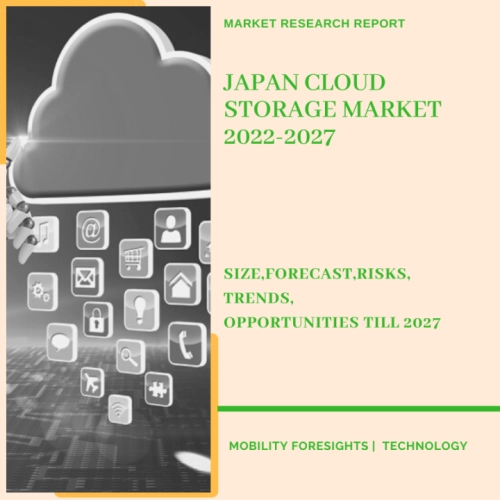
- Get in Touch with Us

Last Updated: Apr 25, 2025 | Study Period: 2022-2027
Cloud storage is a cloud computing approach in which data is stored on the Internet and managed and operated by a cloud computing provider. It's on-demand, with just-in-time capacity and pricing, and it saves you money by not having to acquire and manage your own data storage infrastructure. With "anytime, everywhere" data access, you get agility, global scale, and durability.
A third-party cloud provider owns and operates data storage capacity and offers it via the Internet in a pay-as-you-go manner. These cloud storage providers manage capacity, security, and durability to ensure that data is available to your apps from anywhere on the planet.
The expansion of the cloud storage market has been aided by rising demand linked to digital transformation as well as increased adoption by the public sector in Japan.

The Japan Cloud Storage Market accounted for $XX Billion in 2021 and is anticipated to reach $XX Billion by 2026, registering a CAGR of XX% from 2022 to 2027.
In support of the Japanese government, Fujitsu announced its launch into the cloud market. Fujitsu has created a new cloud service suited for central government agencies and associated companies based on its current "Fujitsu Cloud Service for OSS".
This service will make it possible to build and supply information systems that handle highly private data with safe and flexible operations, which are typically offered on-premises, to the cloud. Fujitsu also intends to support new cloud service security standards. Fujitsu hopes to have installed more than 100 government cloud systems in Japan's core ministries and agencies.
The Japanese government is migrating its information systems to the cloud in order to establish digital governance since the speed of digital transformation has quickened in recent years.
With the introduction of a VMware-powered cloud in Japan, Hitachi has made a small step toward becoming a public cloud provider. The service is referred to as a "sovereign cloud" by the Japanese giant.
VMware coined the term to distinguish some of its partners that run tiny clouds and can attest that their operations are governed by privacy regulations and other legislation specific to the country in which they are located.
The Japanese behemoth already provides a managed cloud powered by VMware that can integrate storage-as-a-service with on-premises and public clouds. A minor additional step toward becoming a cloud provider in its own right, albeit one that runs on a much smaller scale than the major operators, is signing up as a VMware-powered sovereign cloud.
It has already partnered with the Australian company AUCloud to use its IaaS as the foundation of a sovereign cloud, and other collaborations or the introduction of Hitachi-run sovereign clouds are entirely possible.
The cloud object storage infrastructure and related products and services from Seagate Technology are increasing their worldwide reach.In addition to expanding its Lyve Cloud Marketplace and storage service with partners, Seagate is extending a number of regions to support Lyve Cloud.
To further assist businesses in storing, accessing, and moving enormous datasets in multicloud environments while maintaining total control over their data, Lyve Cloud is expanding its line of cloud services. Lyve Cloud Archive storage from Seagate is intended for large-scale video and image repositories, secondary datasets, backup copies, and data that is not used in an analytics or transaction-intensive workflow.
With an integrated purchasing and payment procedure in the platform, the Lyve Cloud Marketplace is built up to assist clients in discovering and purchasing customised solutions from Seagate Lyve Cloud partners.
| Sl no | Topic |
| 1 | Market Segmentation |
| 2 | Scope of the report |
| 3 | Abbreviations |
| 4 | Research Methodology |
| 5 | Executive Summary |
| 6 | Introduction |
| 7 | Insights from Industry stakeholders |
| 8 | Cost breakdown of Product by sub-components and average profit margin |
| 9 | Disruptive innovation in the Industry |
| 10 | Technology trends in the Industry |
| 11 | Consumer trends in the industry |
| 12 | Recent Production Milestones |
| 13 | Component Manufacturing in US, EU and China |
| 14 | COVID-19 impact on overall market |
| 15 | COVID-19 impact on Production of components |
| 16 | COVID-19 impact on Point of sale |
| 17 | Market Segmentation, Dynamics and Forecast by Geography, 2022-2027 |
| 18 | Market Segmentation, Dynamics and Forecast by Product Type, 2022-2027 |
| 19 | Market Segmentation, Dynamics and Forecast by Application, 2022-2027 |
| 20 | Market Segmentation, Dynamics and Forecast by End use, 2022-2027 |
| 21 | Product installation rate by OEM, 2022 |
| 22 | Incline/Decline in Average B-2-B selling price in past 5 years |
| 23 | Competition from substitute products |
| 24 | Gross margin and average profitability of suppliers |
| 25 | New product development in past 12 months |
| 26 | M&A in past 12 months |
| 27 | Growth strategy of leading players |
| 28 | Market share of vendors, 2022 |
| 29 | Company Profiles |
| 30 | Unmet needs and opportunity for new suppliers |
| 31 | Conclusion |
| 32 | Appendix |